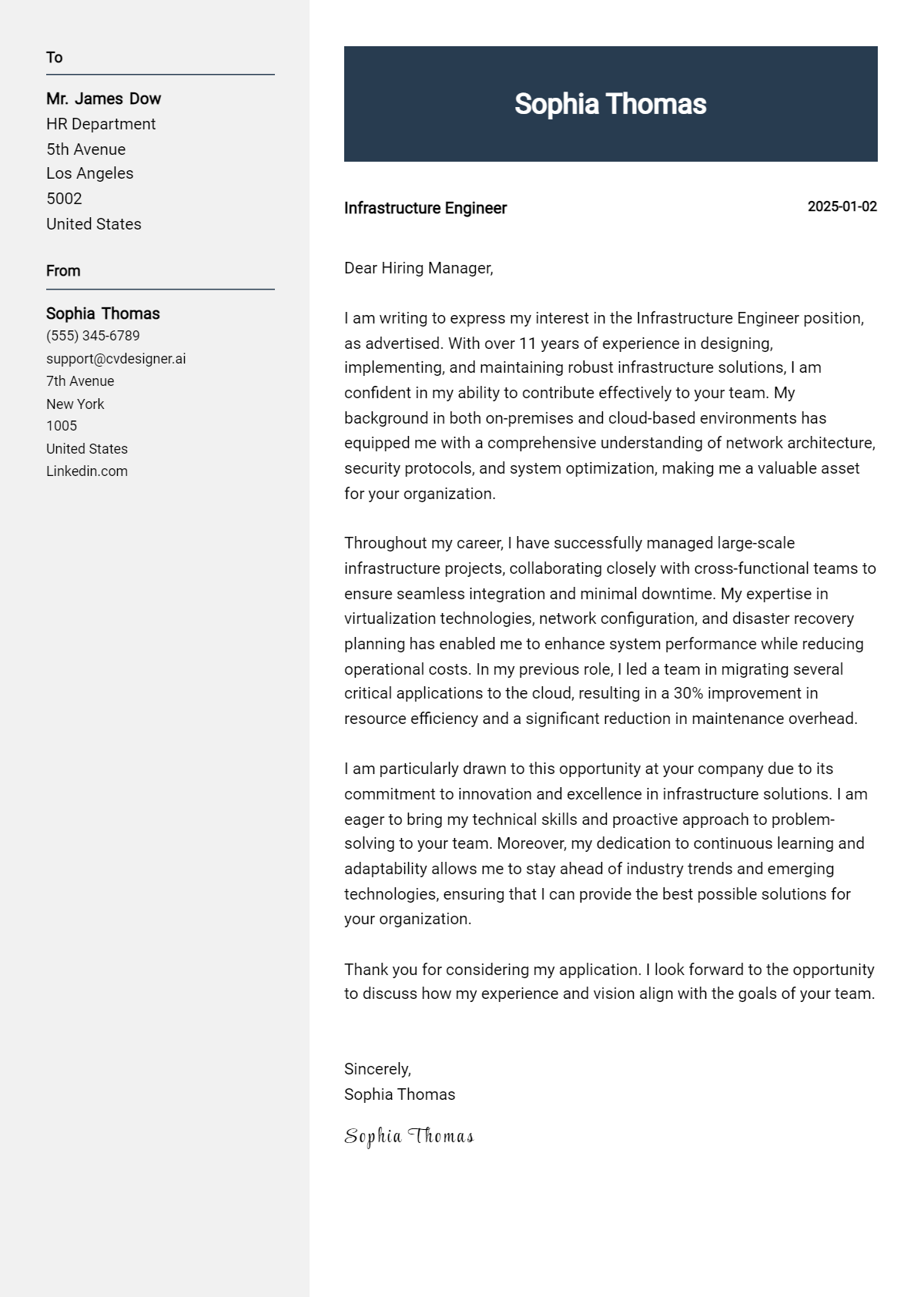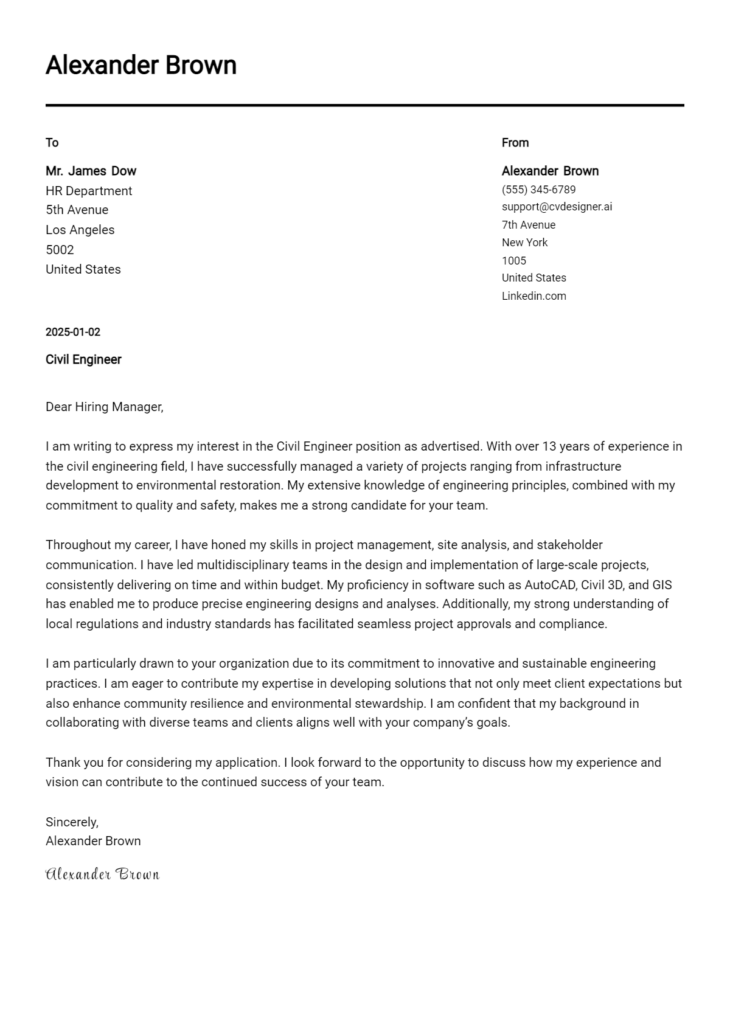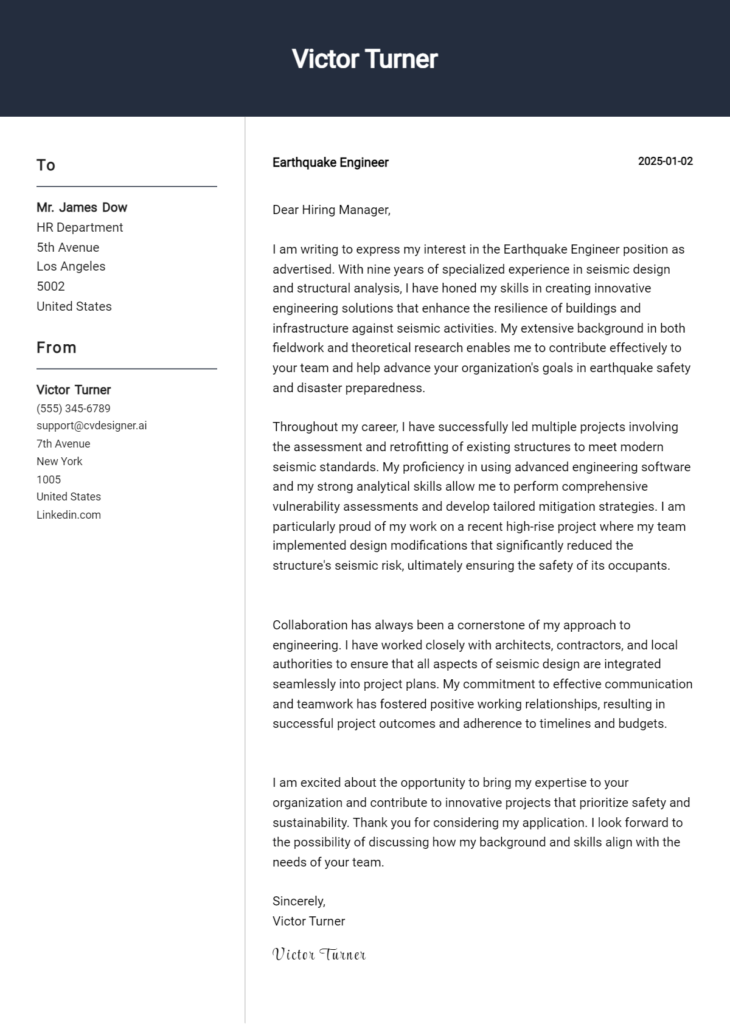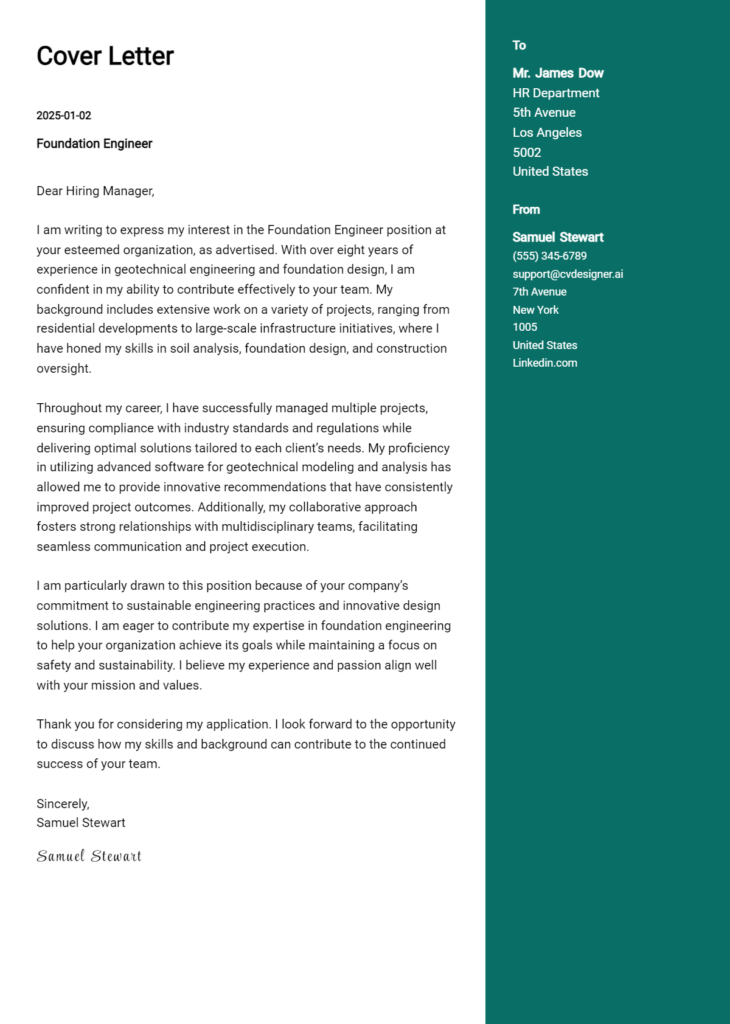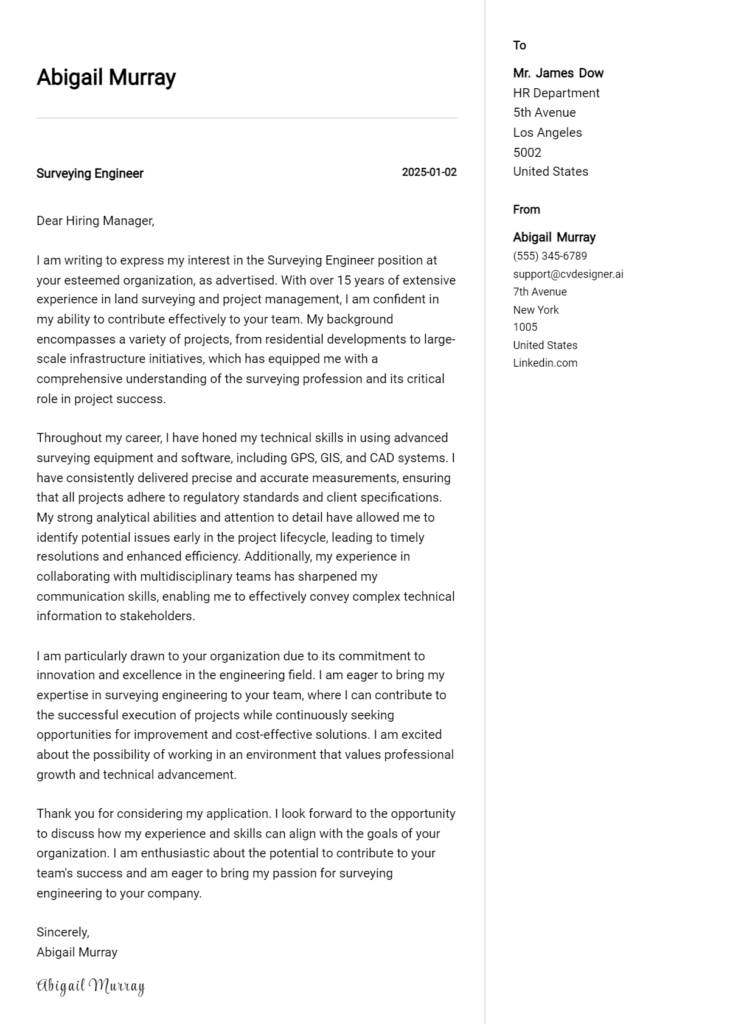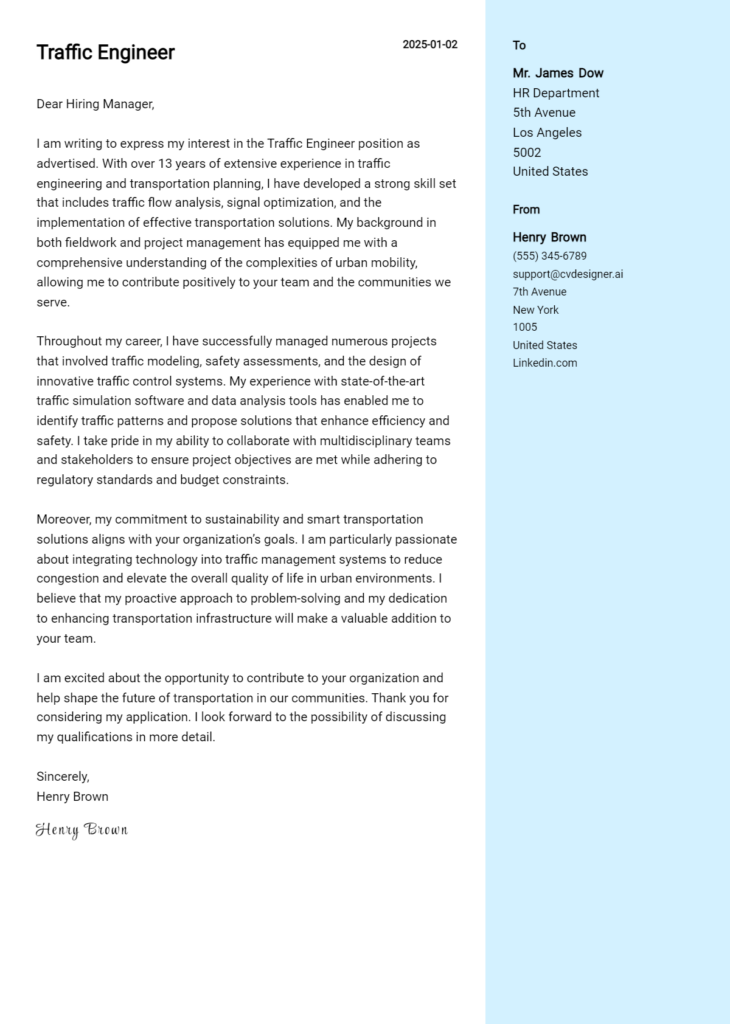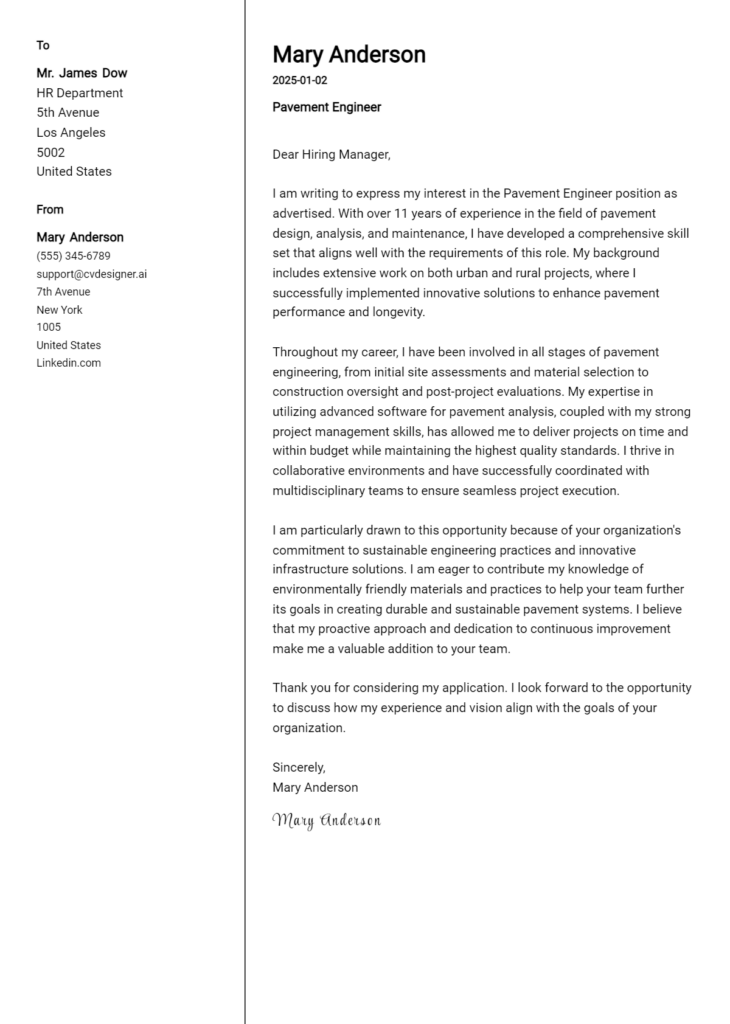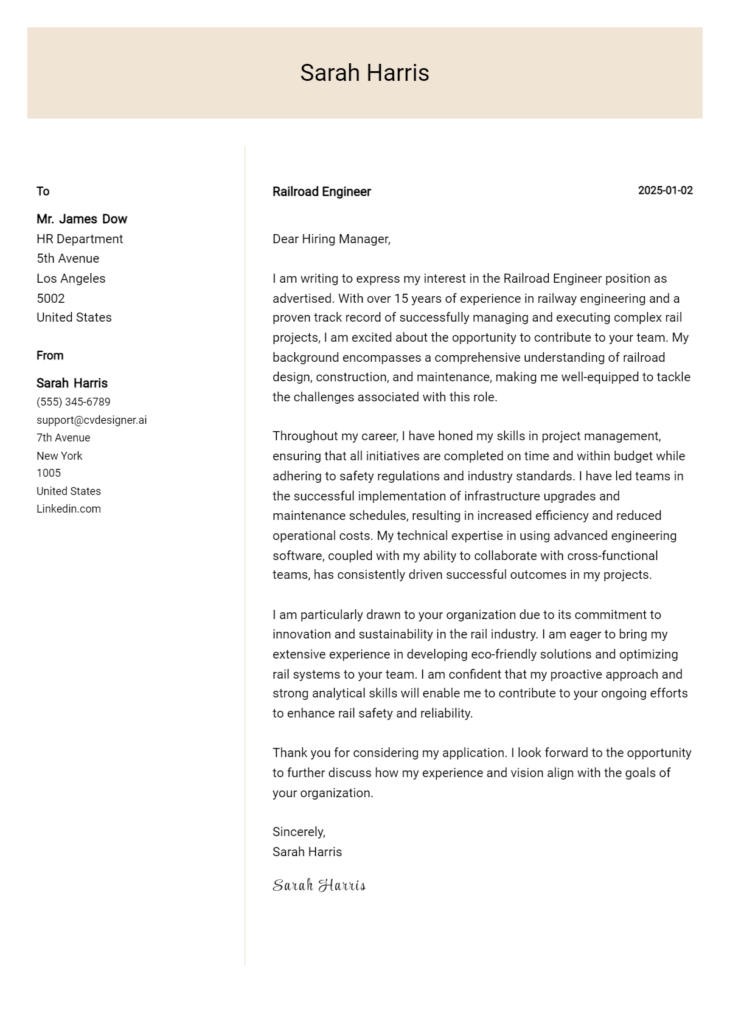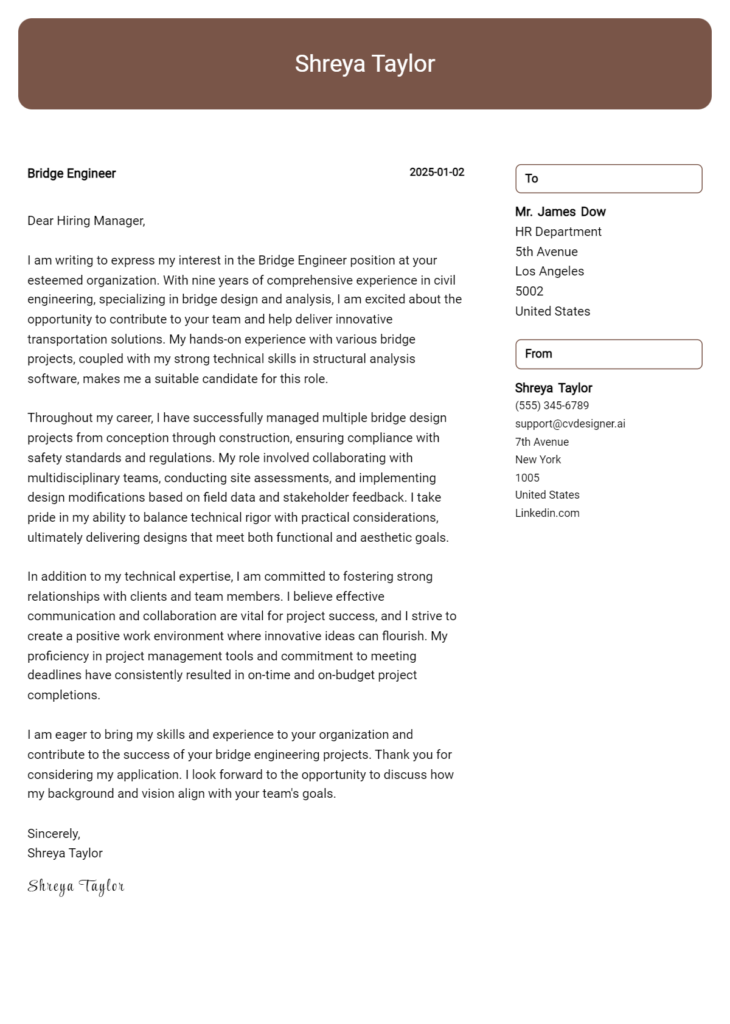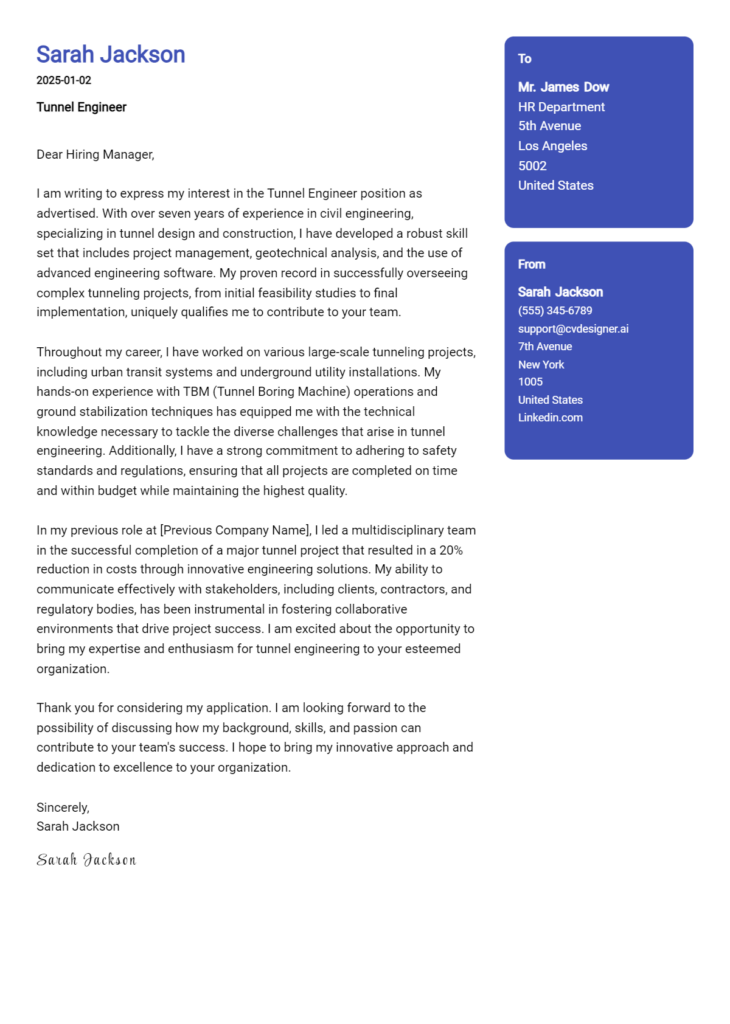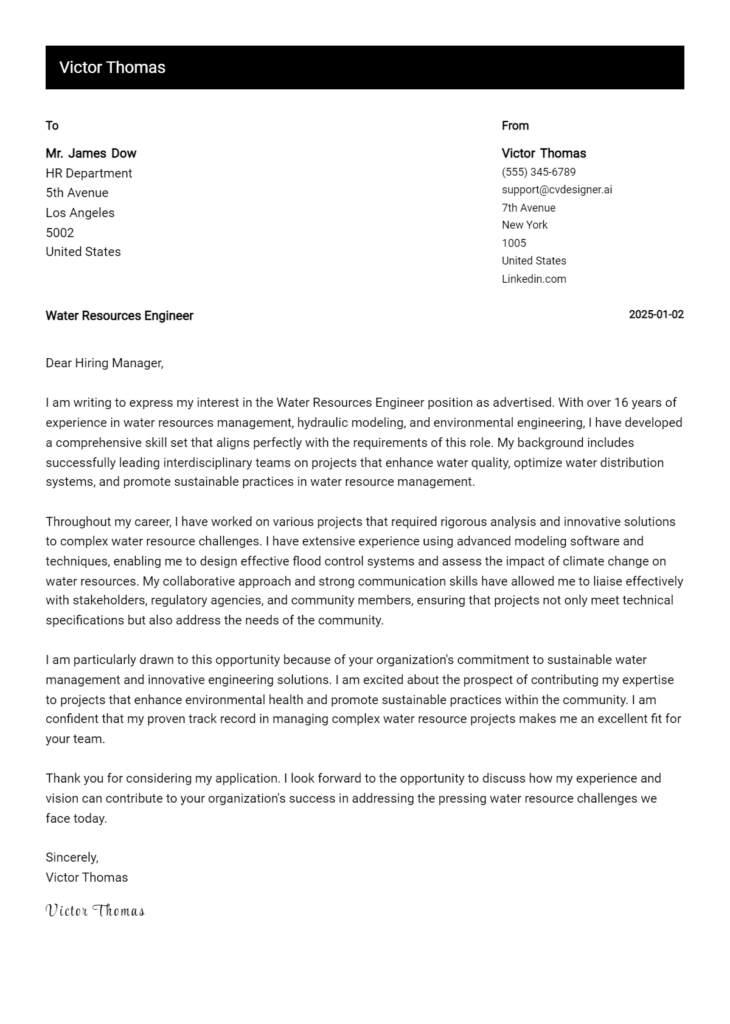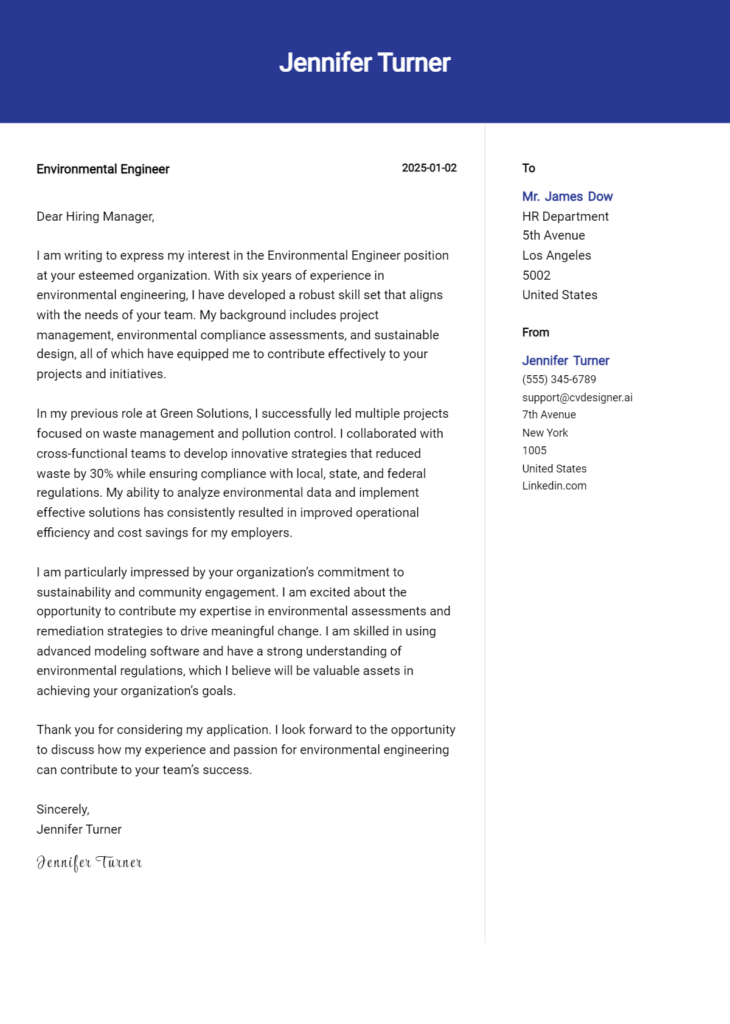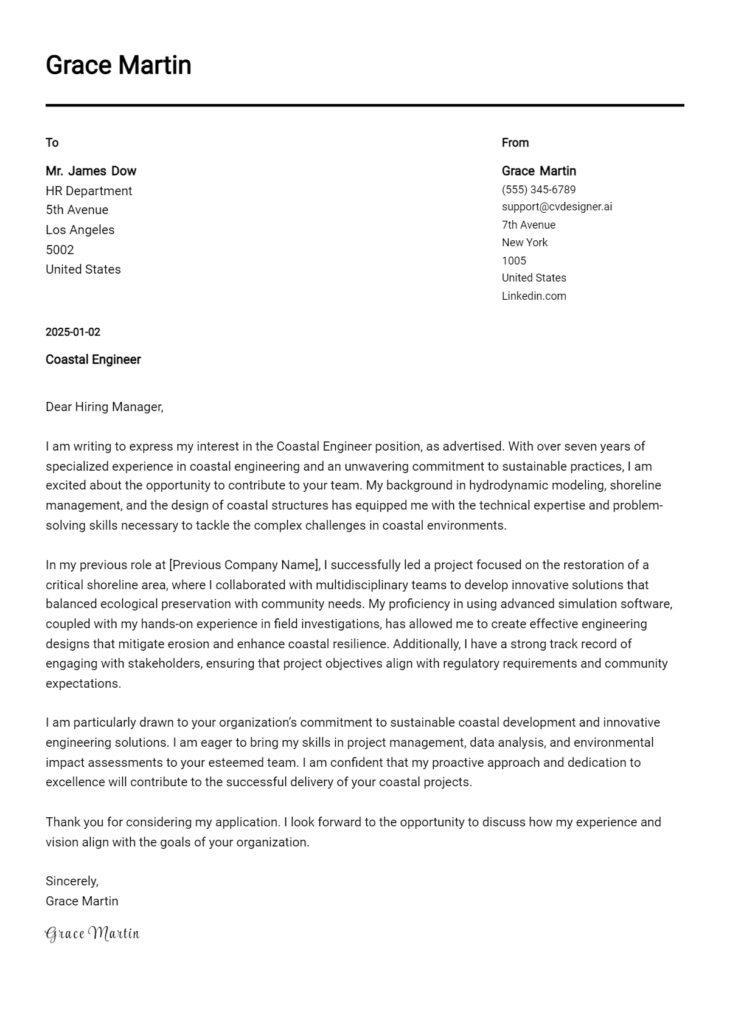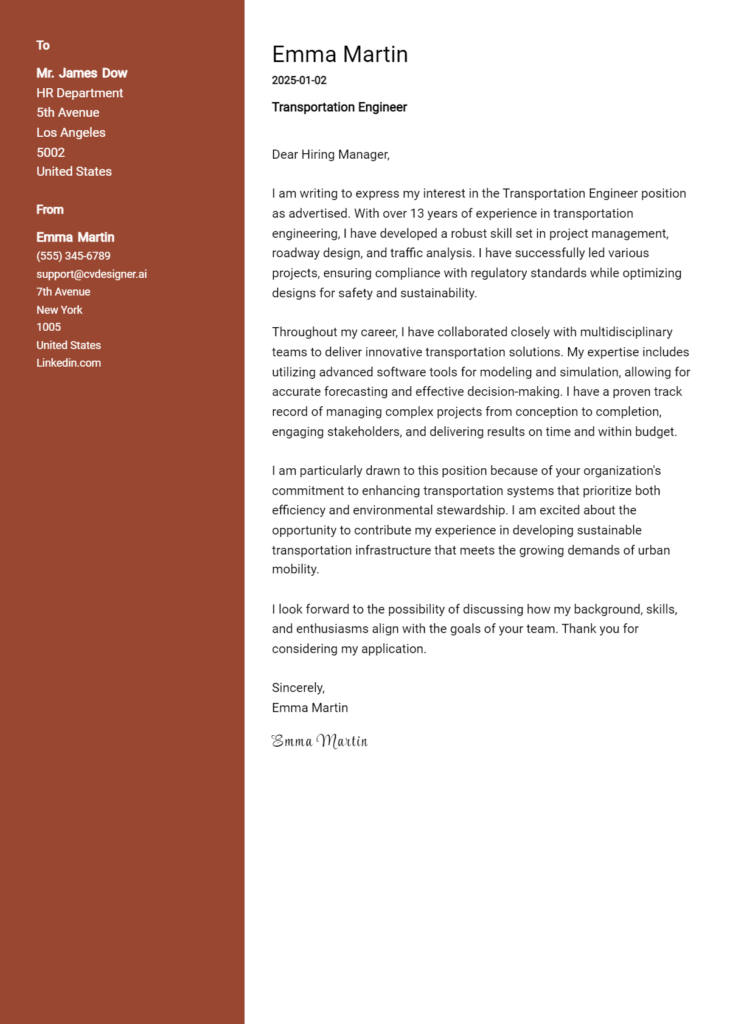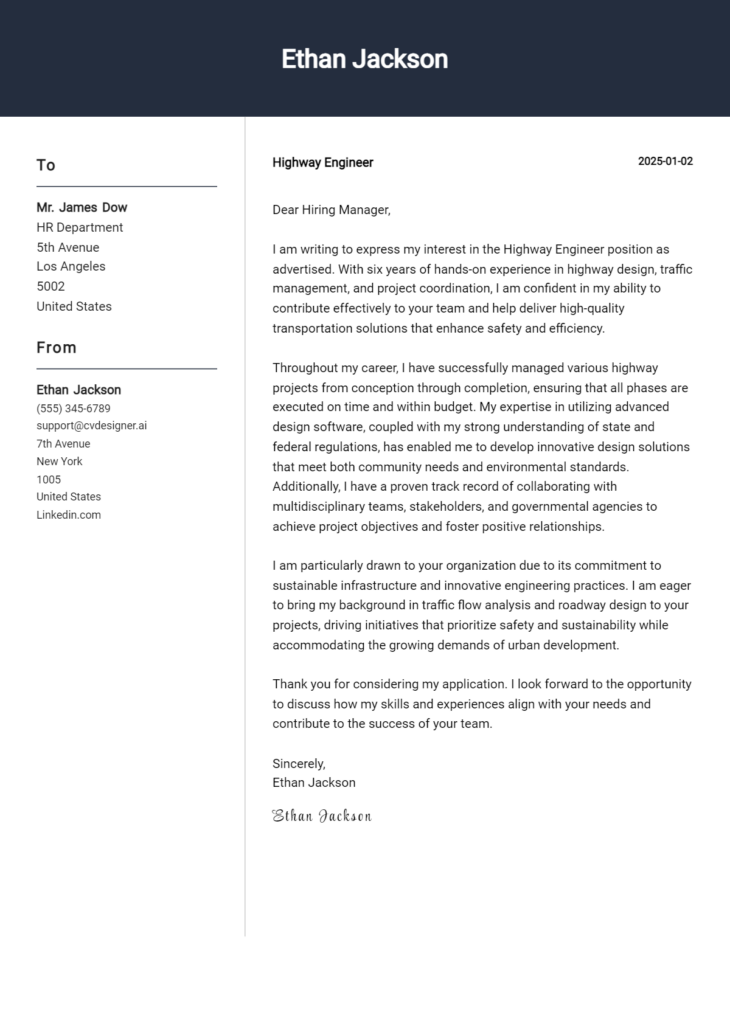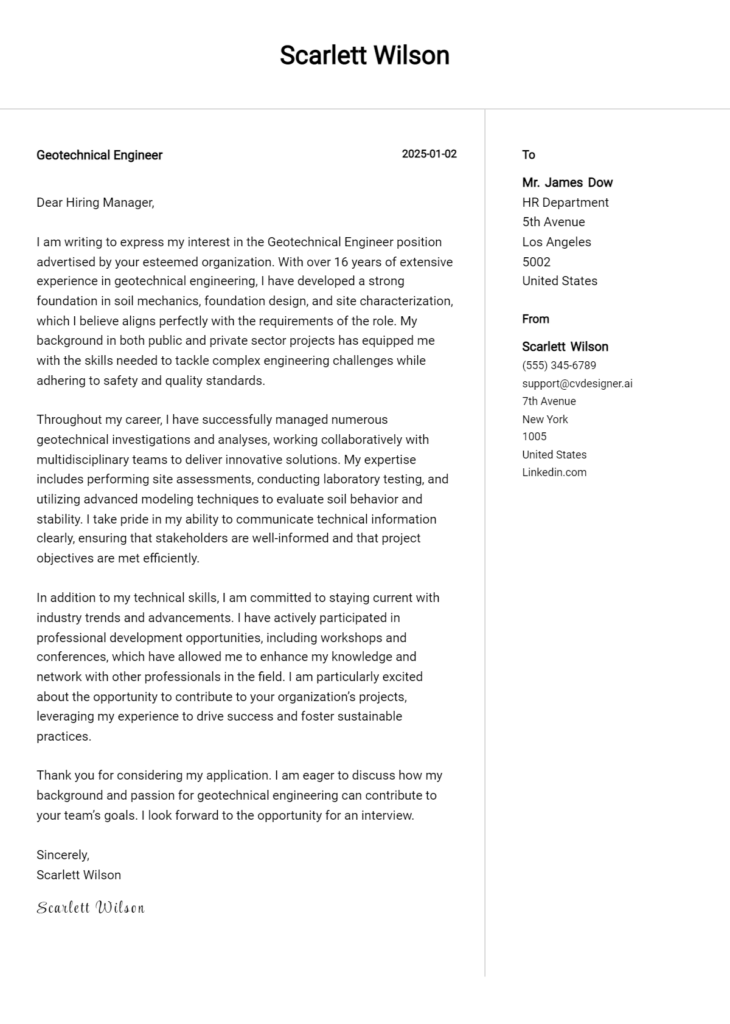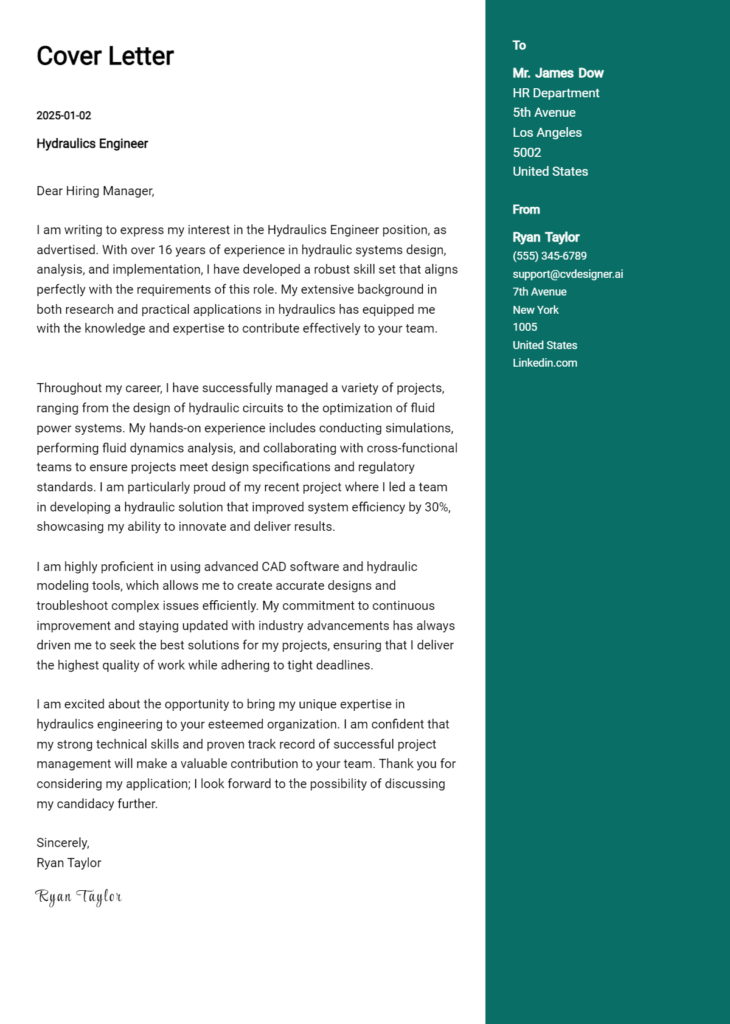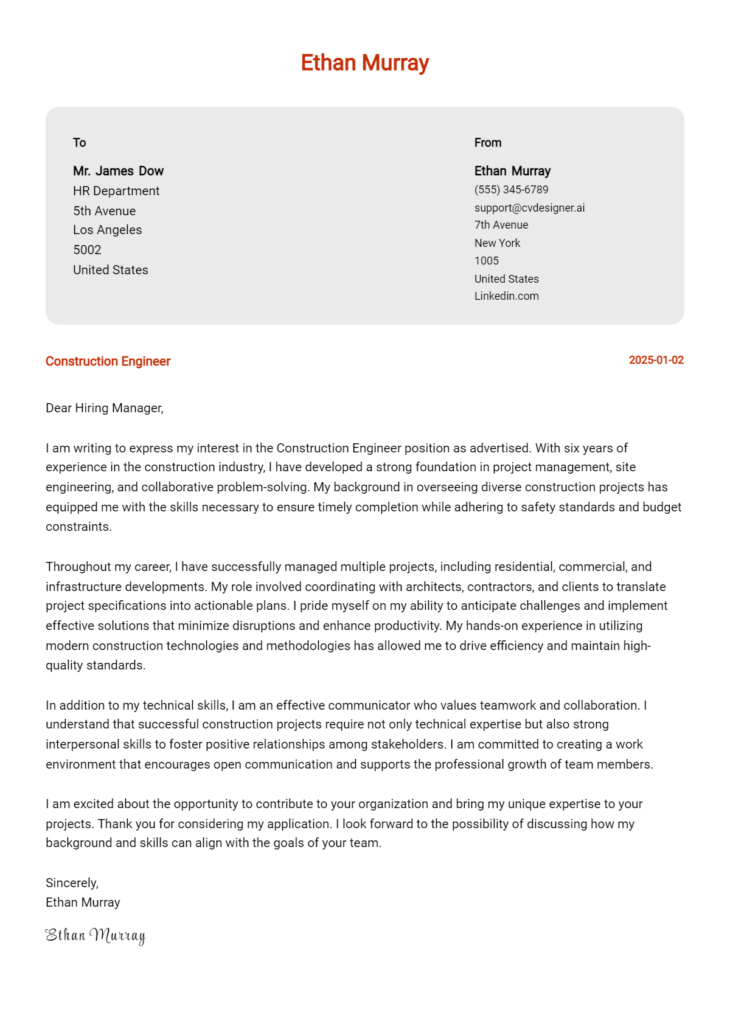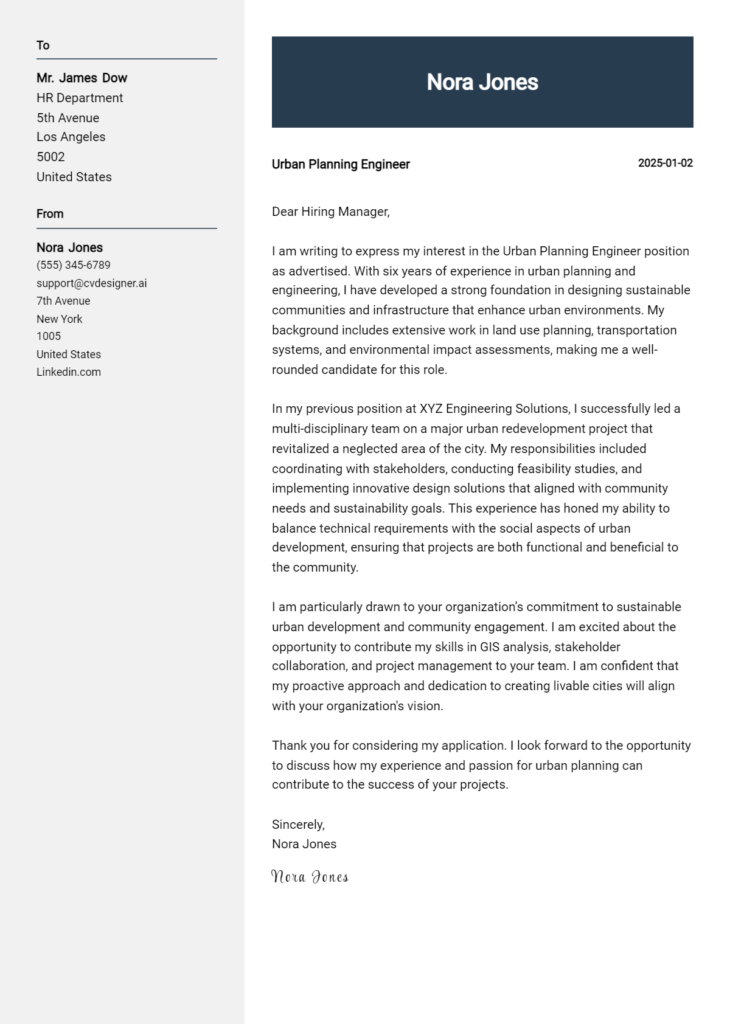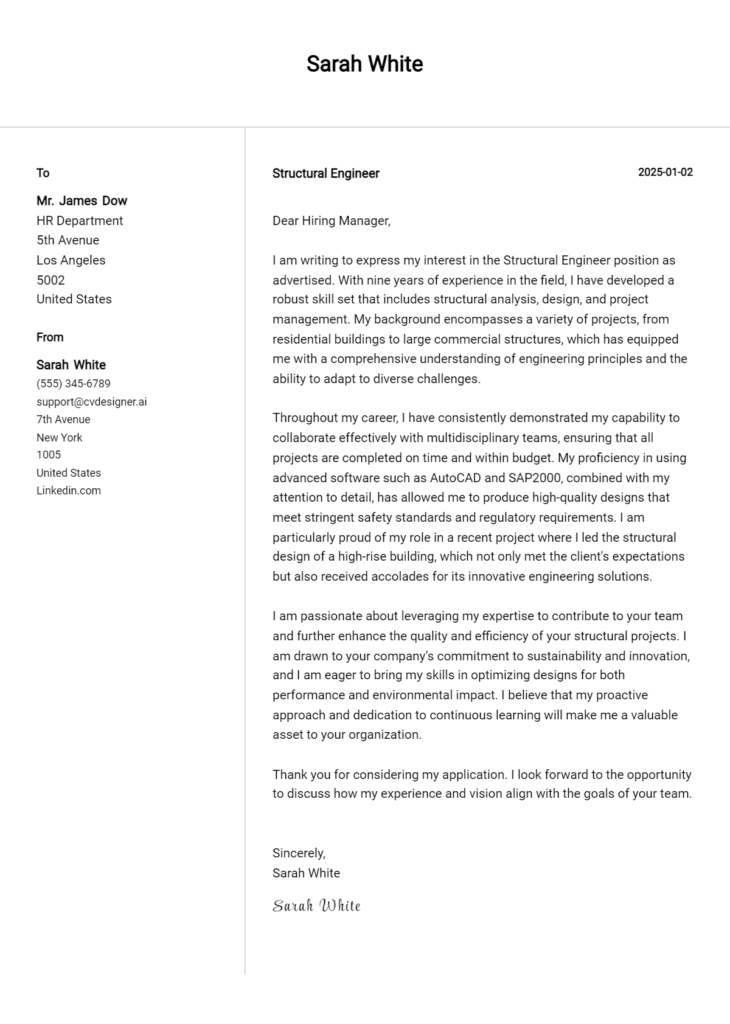Infrastructure Engineer Cover Letter Examples
Explore additional Infrastructure Engineer cover letter samples and guides and see what works for your level of experience or role.
How to Format an Infrastructure Engineer Cover Letter
Crafting a compelling cover letter is essential for an Infrastructure Engineer, as it serves as your first opportunity to impress potential employers. The format of your cover letter not only reflects your technical skills but also demonstrates your organizational abilities and attention to detail—qualities that are vital in the field of infrastructure engineering. A well-structured cover letter can effectively communicate your expertise and enthusiasm, making it easier for hiring managers to see the value you can bring to their team.
In this guide, we’ll explore how to structure your cover letter, providing insights and infrastructure engineering-specific examples to help you create a standout document.
We will focus on the essential components of a professional cover letter, including:
- Cover Letter Header
- Cover Letter Greeting
- Cover Letter Introduction
- Cover Letter Body
- Cover Letter Closing
Each section is crucial in showcasing your qualifications and professionalism. Let’s dive into each part and learn how to make your infrastructure engineer cover letter shine.
Importance of the Cover Letter Header for an Infrastructure Engineer
The header of a cover letter is crucial as it sets the tone for the entire document and establishes a professional first impression. For an Infrastructure Engineer, clarity and professionalism in the header can reflect the attention to detail that is essential in their role. The header should include the applicant's contact information, the date, and the recipient's details. This ensures that the letter is easily identifiable and demonstrates organizational skills. A well-structured header not only enhances readability but also conveys a sense of professionalism that can influence the hiring manager's perception.
Strong Example
John Doe 1234 Network Lane Tech City, TC 56789 johndoe@email.com (123) 456-7890 October 15, 2023 Hiring Manager Infrastructure Solutions Inc. 5678 Server Road Data Town, DT 12345
Weak Example
johndoe@email.com Hey, this is John! 10/15/23 To whom it may concern:
The Importance of a Cover Letter Greeting for an Infrastructure Engineer
The greeting of your cover letter serves as the first impression you make on a potential employer, setting the tone for the rest of your application. A well-crafted greeting demonstrates professionalism and a personal touch, showing that you value the hiring manager's time and are genuinely interested in the position. Instead of using a generic salutation like "To Whom It May Concern," take the time to research the recipient's name and title. This small effort can significantly enhance your credibility and connection with the reader. Here are some tips: look for the hiring manager's name on the company's website, LinkedIn, or in the job listing. If you're unable to find a specific name, consider using "Dear Hiring Manager" as a more personalized alternative.
Strong Greeting Example
Dear Ms. Smith,
Weak Greeting Example
To Whom It May Concern,
Importance of a Strong Cover Letter Introduction for an Infrastructure Engineer
A well-crafted cover letter introduction is essential for an Infrastructure Engineer as it serves as the first impression to the hiring manager. This opening paragraph should not only capture attention but also convey the candidate's genuine interest in the role and highlight key skills or achievements that align with the job requirements. A strong introduction sets the tone for the rest of the cover letter, providing a compelling reason for the hiring manager to continue reading. On the other hand, a weak introduction can diminish the candidate's chances, failing to showcase their qualifications effectively. Below are examples of strong and weak cover letter introductions for an Infrastructure Engineer position.
Strong Example:
Dear [Hiring Manager's Name], As a passionate Infrastructure Engineer with over 7 years of experience in designing and implementing robust network solutions, I was excited to discover the opportunity at [Company Name]. My expertise in cloud infrastructure, combined with my proven track record of optimizing system performance and enhancing security protocols, positions me uniquely to contribute to your team. I am eager to bring my technical skills and innovative mindset to [Company Name] and help drive your infrastructure projects to new heights.
Weak Example:
Hello, I am applying for the Infrastructure Engineer position. I have done some work in IT and think I could be a good fit. I have experience with a few technologies that you mentioned in the job description.
Purpose of the Cover Letter Body for an Infrastructure Engineer
The cover letter body for an Infrastructure Engineer serves as a critical component in presenting the candidate's qualifications, outlining relevant skills, past experiences, and the unique value they can add to the company. It allows the candidate to highlight specific projects or accomplishments that demonstrate their technical proficiency, problem-solving abilities, and adaptability in managing complex infrastructure systems. A well-crafted cover letter body can effectively convey the candidate's enthusiasm for the role while establishing a compelling narrative about their career journey and professional contributions.
Strong Example
As an Infrastructure Engineer with over five years of experience in designing and optimizing network systems, I successfully led a project that improved data center efficiency by 30% through the implementation of virtualization technologies. My role involved collaborating with cross-functional teams to assess infrastructure needs and develop scalable solutions, resulting in a significant reduction in operational costs. Additionally, I have hands-on experience with cloud services such as AWS and Azure, which enabled our team to migrate critical applications seamlessly, enhancing overall system reliability and performance. I am excited about the opportunity to bring my expertise in infrastructure management and system optimization to your organization, contributing to innovative projects that drive business success.
Weak Example
I am applying for the Infrastructure Engineer position because I have some experience in IT. I worked on a few projects and learned about computers and networks. I think I can do a good job at your company. I am looking forward to hearing from you.
Importance of the Cover Letter Closing for an Infrastructure Engineer
The closing paragraph of a cover letter is crucial as it serves to summarize your qualifications, reiterate your interest in the role, and encourage the reader to take the next steps, such as reviewing your resume or scheduling an interview. A strong closing leaves a lasting impression and reinforces your suitability for the position, while a weak closing can diminish the impact of the entire letter.
Strong Example
Thank you for considering my application for the Infrastructure Engineer position. I am excited about the opportunity to bring my expertise in cloud architecture and network security to your team. I believe my skills align well with the requirements of the role, and I am eager to contribute to your organization’s success. I look forward to discussing my application further and am available for an interview at your earliest convenience. Please find my resume attached for your review.
Weak Example
I hope you think about my application. I'm not sure if I’m a perfect fit, but I’d like to talk more about it. You can look at my resume if you want. Thanks for your time.
Crafting an effective cover letter is crucial for Infrastructure Engineer candidates looking to stand out in a competitive job market. A well-written cover letter not only introduces your technical skills and experience but also highlights your problem-solving abilities, understanding of the Software Development Life Cycle (SDLC), teamwork, and commitment to continuous learning. Here are some tips to help you write a compelling cover letter that showcases your qualifications and enthusiasm for the role.
Tips for Writing an Effective Cover Letter for Infrastructure Engineer
Highlight Your Technical Skills
Clearly outline your technical proficiencies relevant to the role, such as experience with cloud services, networking, server management, and virtualization. Use specific examples to demonstrate how you’ve applied these skills in previous positions. This will give hiring managers confidence in your capabilities.Showcase Your Problem-Solving Abilities
Infrastructure Engineers often face complex challenges. Share a specific instance where you successfully resolved an issue, detailing the steps you took and the outcome. This not only illustrates your analytical skills but also your ability to remain calm under pressure and find effective solutions.Demonstrate Your Knowledge of the SDLC
Emphasize your understanding of the Software Development Life Cycle and how it relates to infrastructure work. Mention any methodologies you’ve used, like Agile or Waterfall, and provide examples of how your involvement in the SDLC has positively impacted project outcomes.Emphasize Teamwork and Collaboration
Infrastructure Engineers frequently collaborate with cross-functional teams. Highlight your ability to work well in a team environment by sharing experiences where you contributed to successful projects. Mention any leadership roles you’ve held or instances where you facilitated communication between technical and non-technical stakeholders.Express Your Passion for Continuous Learning
The tech landscape is always evolving, and a commitment to lifelong learning is essential. Talk about any recent certifications, courses, or self-study you’ve pursued to stay updated on industry trends and technologies. This will demonstrate your proactive approach to professional development and your readiness to adapt to new challenges.
By following these tips, you can create a compelling cover letter that effectively showcases your qualifications as an Infrastructure Engineer. If you need additional resources, consider exploring cover letter templates and a cover letter builder to help you get started.
Common Mistakes to Avoid in an Infrastructure Engineer Cover Letter
Crafting an effective cover letter is essential for capturing the attention of hiring managers and showcasing your qualifications as an Infrastructure Engineer. Avoiding common mistakes can significantly enhance your chances of landing an interview. Here are some frequent pitfalls to watch out for:
Generic Content: Using a one-size-fits-all cover letter can undermine your application. Tailor your letter to the specific job and company. Research the organization and include relevant information that aligns with their goals.
Neglecting Proper Format: A poorly formatted cover letter can detract from your professionalism. Follow a clear structure, using a standard cover letter format to ensure readability. For tips, check out this cover letter format.
Failure to Highlight Relevant Skills: Infrastructure Engineering requires specific technical skills. Make sure to showcase your relevant experience and certifications clearly, emphasizing how they relate to the job.
Overly Lengthy Letters: Keep your cover letter concise; ideally, it should be one page. Focus on the most pertinent information to keep the reader engaged.
Ignoring the Call to Action: A strong closing statement encourages the employer to take action. Politely express your desire for an interview and provide your contact details.
Spelling and Grammar Errors: Mistakes in your cover letter can create a negative impression. Proofread your document and consider using tools for grammar checks to avoid any errors.
Not Including Examples: When discussing your achievements or experience, provide specific examples that demonstrate your skills in action. This adds credibility to your claims.
For inspiration and to see how effective cover letters look, explore these cover letter examples. By steering clear of these common mistakes, you can create a compelling cover letter that stands out to potential employers.
Cover Letter FAQs for Infrastructure Engineer
What should I include in my cover letter as an Infrastructure Engineer?
In your cover letter, highlight your technical skills relevant to infrastructure engineering, such as network design, cloud computing, and systems integration. Begin with a clear introduction that states the position you’re applying for and why you’re interested. Discuss your relevant experience, emphasizing your achievements in managing infrastructure projects, optimizing systems, and ensuring network security. It's beneficial to mention specific technologies you have worked with, such as AWS, Azure, or virtualization tools. Also, express your understanding of the company’s goals and how your expertise can help them achieve these objectives. Lastly, close with a strong statement of interest and a call to action for an interview.
How do I tailor my cover letter for a specific Infrastructure Engineer position?
To tailor your cover letter, start by carefully reviewing the job description. Identify key skills, qualifications, and responsibilities that the employer is seeking. Incorporate these elements into your cover letter by providing examples from your previous work that demonstrate your proficiency in those areas. For instance, if the job emphasizes cloud infrastructure, discuss your experience with cloud services and any successful projects you’ve led. Additionally, research the company’s culture and projects to align your values and aspirations with theirs, showcasing your enthusiasm for contributing to their team. Personalizing your cover letter shows that you value the opportunity and are genuinely interested in the position.
How long should my cover letter be for an Infrastructure Engineer position?
Your cover letter should typically be one page long, which equates to about three to four paragraphs. Aim for a concise and focused approach while providing enough detail to highlight your qualifications. Start with a strong opening paragraph that captures the reader’s attention, followed by a body section that elaborates on your relevant experience and skills. Use bullet points if necessary to list key achievements or technologies. Conclude with a brief summary of why you’re an ideal candidate and express your eagerness for the opportunity to discuss your application further. Keeping your cover letter succinct ensures that hiring managers can quickly grasp your qualifications and fit for the role.
Should I include technical jargon in my cover letter?
Including technical jargon in your cover letter can be beneficial, but it should be used judiciously. While it shows your familiarity with industry-specific language and concepts, ensure that the terms you use are relevant to the position and understandable to the reader, who may not be a technical expert. Aim to strike a balance between showcasing your technical expertise and maintaining clarity. For instance, you might mention specific tools or methodologies (like Agile or DevOps) but avoid overly complex language that could alienate the hiring manager. Ultimately, your goal is to communicate your qualifications effectively while demonstrating that you can translate technical knowledge into practical solutions for the company.
Build your Cover Letter in minutes
Use an AI-powered cover letter builder and have your letter done in 5 minutes. Just select your template and our software will guide you through the process.

